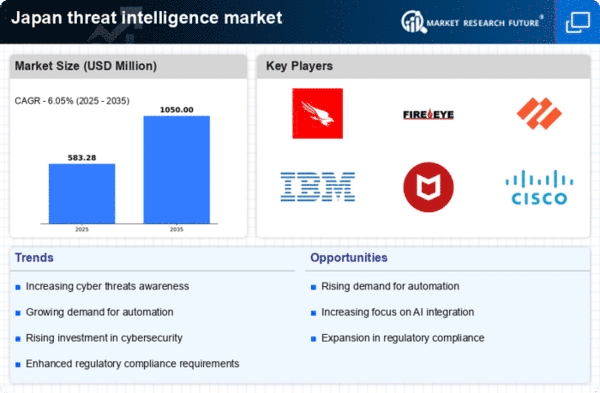Rising Awareness of Data Privacy
In Japan, the rising awareness of data privacy issues is driving the demand for threat intelligence solutions. With the implementation of stringent data protection regulations, organizations are increasingly focused on safeguarding sensitive information. The threat intelligence market is likely to benefit from this heightened awareness, as businesses seek to comply with laws such as the Act on the Protection of Personal Information (APPI). This regulatory framework mandates organizations to adopt robust security measures, including threat intelligence solutions, to mitigate risks associated with data breaches. As a result, the market is projected to grow at a CAGR of approximately 12% over the next five years. The emphasis on data privacy not only influences organizational policies but also shapes the development of innovative threat intelligence services tailored to meet compliance requirements, thereby enhancing the overall market landscape.
Escalating Cyber Threat Landscape
The threat intelligence market in Japan is experiencing a surge due to the escalating cyber threat landscape. With increasing incidents of cyberattacks, organizations are compelled to invest in advanced threat intelligence solutions. Reports indicate that cybercrime costs in Japan could reach approximately $1 trillion by 2025, highlighting the urgency for robust security measures. This alarming trend drives businesses to seek comprehensive threat intelligence services to safeguard their digital assets. The growing sophistication of cybercriminals necessitates a proactive approach, prompting companies to adopt threat intelligence solutions that provide real-time insights and predictive analytics. As a result, the demand for threat intelligence services is expected to grow significantly, with a projected CAGR of around 15% over the next five years. This dynamic environment underscores the critical role of threat intelligence in enhancing organizational resilience against cyber threats.
Emergence of Advanced Technologies
The emergence of advanced technologies is reshaping the threat intelligence market in Japan. Innovations such as artificial intelligence (AI), machine learning (ML), and big data analytics are being integrated into threat intelligence solutions, enhancing their effectiveness. These technologies enable organizations to analyze vast amounts of data, identify patterns, and predict potential threats with greater accuracy. As a result, the demand for sophisticated threat intelligence services is likely to increase, as businesses seek to leverage these advancements to bolster their security posture. The market is projected to grow by approximately 18% over the next five years, driven by the need for real-time threat detection and response capabilities. This technological evolution not only improves the efficiency of threat intelligence solutions but also fosters a competitive landscape, encouraging continuous innovation within the market.
Government Initiatives and Support
The Japanese government is actively promoting cybersecurity initiatives, which significantly impacts the threat intelligence market. Various policies and frameworks have been established to enhance national cybersecurity posture, encouraging organizations to adopt threat intelligence solutions. For instance, the Cybersecurity Strategy of Japan aims to bolster the country's defenses against cyber threats, fostering collaboration between public and private sectors. This governmental support is likely to stimulate investments in threat intelligence technologies, as organizations seek to comply with national standards and regulations. Furthermore, the government has allocated substantial funding to enhance cybersecurity infrastructure, which may lead to a projected increase in the threat intelligence market by approximately 20% over the next few years. Such initiatives not only enhance the overall security landscape but also create a conducive environment for the growth of the threat intelligence market.
Increased Investment in Cybersecurity
The threat intelligence market in Japan is witnessing increased investment in cybersecurity as organizations recognize the critical need for advanced security measures. With the rise in cyber threats, companies are allocating larger budgets towards threat intelligence solutions to protect their assets. Recent studies suggest that Japanese enterprises are expected to spend over $10 billion on cybersecurity by 2026, indicating a robust growth trajectory for the threat intelligence market. This influx of capital is likely to drive innovation and the development of cutting-edge threat intelligence technologies. Furthermore, organizations are increasingly prioritizing threat intelligence as a core component of their cybersecurity strategies, leading to a more integrated approach to threat detection and response. This trend not only enhances the effectiveness of security measures but also positions the threat intelligence market for sustained growth in the coming years.
















